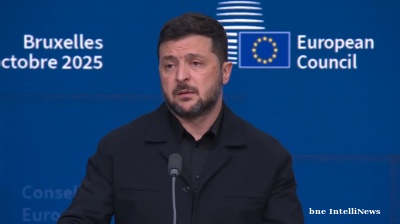MPs from the largest party in Macedonia’s parliament, the conservative VMRO-DPMNE, have managed to block the appointment of a speaker with a marathon debate that has already lasted 10 days.
The Social Democratic Union of Macedonia (SDSM) wants to form a new government with the support of parties representing the ethnic Albanian minority. However, a new government cannot be formed until a speaker has been elected as the speaker has to nominate the prime minister, and VMRO-DPMNE - which has ruled Macedonia since 2006 - appears determined to prevent the opposition taking power.
Since the constitutive session of parliament opened on March 28, the 51 VMRO-DPMNE MPs have made lengthy speeches, asking questions to each other to ensure that the debate continues. While the parliament takes a break overnight and at weekends, the debate resumes each morning, and there is currently no end in sight.
In an attempt to force a vote, the SDSM filed a motion for a speaker to be elected directly without a debate but this was rejected, and the debate is set to continue on April 11.
VMRO-DPMNE threatened in a statement that if the SDSM managed to launch procedures to elect a speaker it would “react firmly” and the SDSM “should expect that it will face serious reactions from people in Macedonia”.
The country has now been without a government for four months, since the December 11 election.
VMRO-DPMNE did not win enough seats to form a majority government and failed to put together a coalition. Meanwhile, SDSM leader Zoran Zaev, who has formed a parliamentary majority of 67 MPs with three ethnic Albanian parties, has so far been denied a mandate by President Gjorge Ivanov, who is close to VMRO-DPMNE.
At the centre of the dispute with Ivanov is Zaev’s backing for a platform drawn up by the Albanian parties, which envisages more rights for Macedonia’s Albanian minority. The platform was announced in early January as a condition for the participation of ethnic Albanian parties in the new government.
Ivanov argues that the SDSM’s backing for the platform is unconstitutional as it threatens the sovereignty of the country. The civil organisation For United Macedonia has been holding protests against the platform in Skopje and other cities in Macedonia. Its leaders, who are close to VMRO-DPMNE, have called on more Macedonians to join the rallies to block the formation of the new government.
Adding to VMRO-DPMNE's determination to block an SDSM government are the ongoing investigations into several high-ranking VMRO-DPMNE officials, including the party's leader, former Prime Minister Nikola Gruevski. Should the SDSM take power, it will ensure that the work of the special prosecutor, which was set up to probe suspected high-level corruption, continues.
Meanwhile, a European Commission official has said she expects Macedonian MPs to elect a new parliament speaker and a new government as soon as possible.
“We have been quite clear of what we expect to happen in the country. At this stage we are following the developments,” EC spokesperson Maja Kocijancic told a press conference in Brussels news agency MIA reported.
“We have said repeatedly that the result of the recent parliamentary election must be respected and parties to end the current uncertain situation,” she said, adding that the government must be established without any delay based on the parliamentary majority.
Kocijancic noted that EU officials had urged Ivanov to reconsider his previous decision and give a mandate to Zaev to form a new government.
The record for a filibuster is held by the South Korean parliament, where opposition lawmakers spoke for 192 hours non-stop in an attempt to block an anti-terror bill they feared would put personal freedoms at risk.
News
Category 5 hurricane Melissa bears down on Jamaica with Haiti and Cuba in storm's path
A catastrophic Category 5 hurricane was bearing down on Jamaica on Monday, October 27 afternoon with sustained winds of up to 282kph (175mph), threatening to become the strongest storm the Caribbean island has ever experienced.
.jpg)
US senator tells Maduro "head to Russia or China" as warships close in on Venezuela
A senior US Republican senator has warned that Venezuelan President Nicolás Maduro's time in power is running out and suggested he leave the country, as military tensions in the Caribbean continue to escalate.

Milei celebrates resounding victory in Argentina's midterm elections
Argentine President Javier Milei scored a major win for his La Libertad Avanza (LLA) party in Argentina's October 26 midterm legislative elections, as the party obtained approximately 40.84% of the nationwide vote with 99.14% of the votes counted.

Zelenskiy accuses China of aiding Russia’s war effort through industrial and military support
Ukrainian President Volodymyr Zelenskiy accused China of materially supporting Russia’s military-industrial complex, providing key technologies and resources that have enabled Moscow to sustain and scale its war effort against Ukraine.




